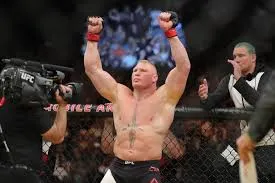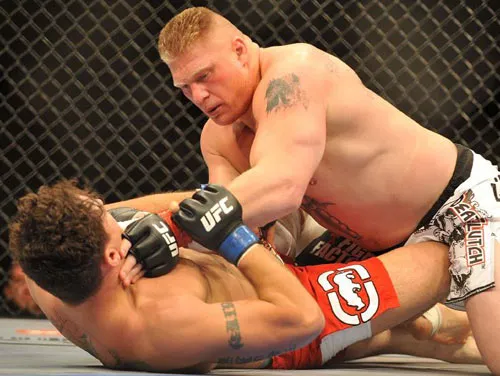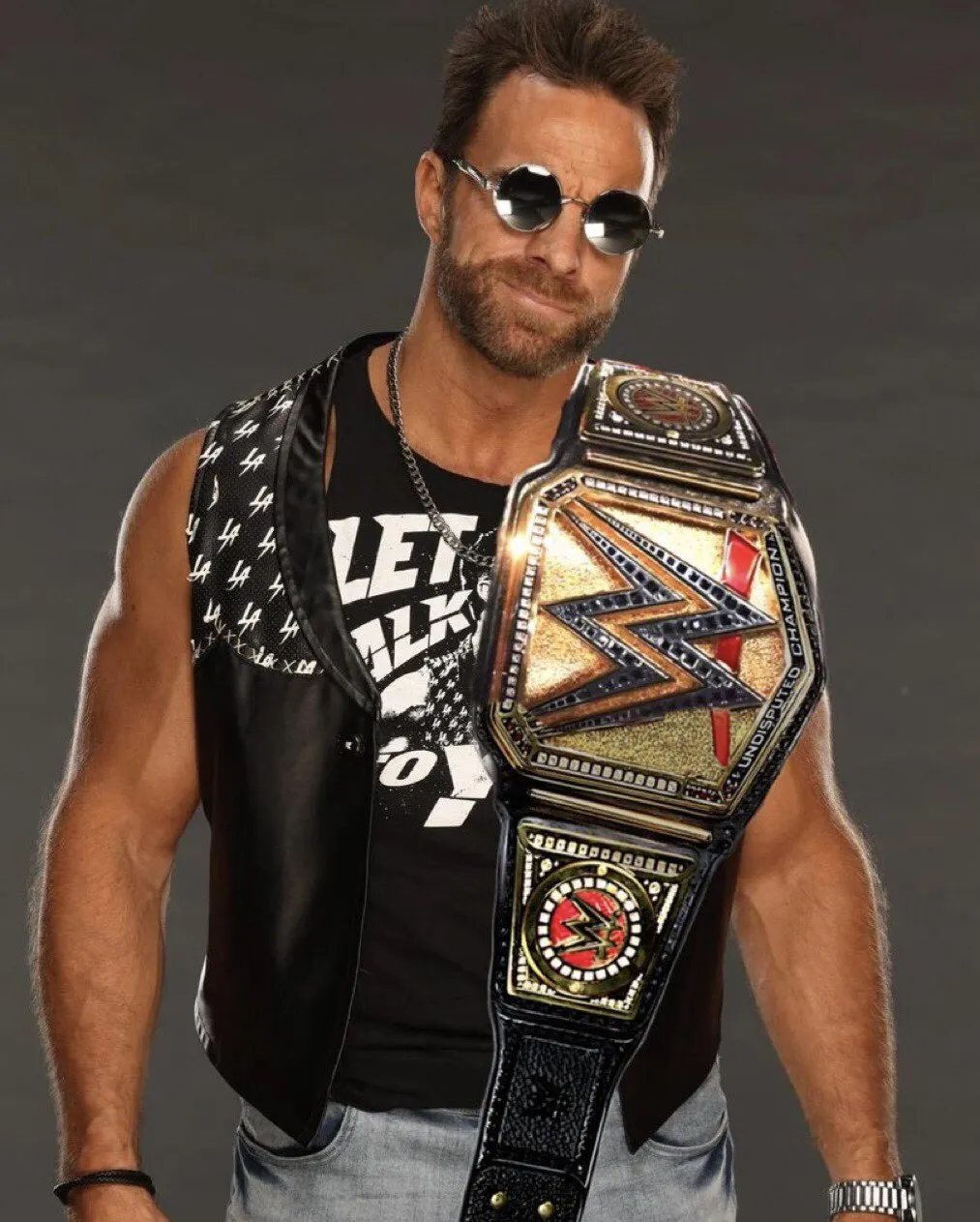

The Night Brock Lesnar Shook the Octagon — Inside His Game-Changing UFC 100 Victory That Still Echoes Today
A New Beast Enters the Octagon
On July 11, 2009, the UFC 100 event became more than just another milestone in the world of mixed martial arts. It became a cultural turning point—an explosive showcase of power, controversy, and sheer spectacle that forever altered the trajectory of the sport. At the heart of it all was Brock Lesnar, a name already forged in the world of professional wrestling, but still fresh and controversial in the MMA scene.

Lesnar wasn’t your average heavyweight. Towering at 6’3”, weighing over 265 pounds, and boasting the athleticism of a middleweight, Lesnar arrived in the Ultimate Fighting Championship like a living embodiment of brute force. But it wasn’t just his physique or pro-wrestling pedigree that made headlines—it was his brash attitude, unapologetic persona, and the speed with which he ascended the UFC ranks.
When Lesnar stepped into the Octagon at UFC 100 to face Frank Mir, it was more than a title unification bout. It was a grudge match, a revenge mission, and the climax of a storyline that blurred the lines between professional wrestling drama and legitimate combat sport.
The First Encounter: Mir’s Submission, Lesnar’s Lesson
To truly understand the weight of UFC 100, one must rewind to UFC 81, where Lesnar made his second UFC appearance against Frank Mir. At that time, Lesnar was a wildcard—a WWE champion with just one MMA victory. Critics saw him as a promotional gimmick, and the MMA purists scoffed at the idea of a “fake wrestler” competing with seasoned jiu-jitsu practitioners.
During their first meeting, Lesnar came out like a freight train, blitzing Mir with ground-and-pound. However, his inexperience in submission defense was quickly exposed. Mir caught Lesnar in a textbook kneebar, forcing the tap and humbling the giant in just over 90 seconds. The defeat ignited a personal fire in Lesnar. He wasn’t just beaten—he was embarrassed.
Rather than retreating, Lesnar did what few expected: he trained harder, focused deeper, and returned more dangerous than ever.
The Road to UFC 100: A Meteoric Rise
After the Mir loss, Lesnar regrouped with legendary coach Greg Nelson and MMA pioneer Erik Paulson. He honed his wrestling-based ground game, improved his striking, and sharpened his awareness of submissions. It didn’t take long before Lesnar was back in the cage, and back in the win column.
His victory over Heath Herring at UFC 87 was a one-sided display of dominance. Lesnar’s athleticism overwhelmed Herring for three rounds, showcasing that he wasn’t just strong—he was fast, tactical, and relentless.
Then came the big break: a shot at Randy Couture’s heavyweight title. At UFC 91, Lesnar shocked the world by defeating the veteran champion via TKO in the second round. The wrestling world cheered, the MMA world gasped, and suddenly, Brock Lesnar was not just a UFC fighter—he was the UFC Heavyweight Champion.
UFC 100: The Most Anticipated Rematch in Heavyweight History
The build-up to UFC 100 was electric. It wasn’t just the centennial event for the UFC—it was a symbol of how far the sport had come. The card featured Georges St-Pierre, Dan Henderson, and Michael Bisping, but the spotlight burned brightest on the main event: Lesnar vs. Mir II.
By now, the narrative had evolved from newcomer vs. veteran to champion vs. spoiler. Frank Mir, bolstered by his improved striking and a submission win over Antônio Rodrigo Nogueira, was confident that lightning could strike twice. Meanwhile, Lesnar saw Mir as unfinished business—a scar on an otherwise meteoric rise.
Tensions rose in the pre-fight media. Lesnar was combative, brash, and unapologetically cocky. He mocked Mir’s physique, his skill set, and even the legitimacy of his first victory. For Lesnar, this wasn’t just a fight. It was personal redemption, an exorcism of past mistakes.
Inside the Cage: A One-Sided Destruction
The fight began with Lesnar charging forward, taking Mir down within seconds. From there, the game plan was clear: control, smash, dominate. Unlike their first encounter, Lesnar showed incredible awareness on the ground. He stayed clear of Mir’s hips, avoided submission traps, and delivered devastating punches from the top position.
Mir tried to survive, locking down Lesnar’s posture and throwing elbows from the bottom. But it was a losing battle. Lesnar’s ground-and-pound was relentless. His fists sounded like hammers hitting meat. By the end of the first round, Mir’s face was bloodied, his energy waning.
Round two began much the same. Mir threw a few desperate knees, but Lesnar powered through them like a machine. Once on the ground again, the punishment resumed. Mir was defenseless. The referee stepped in at 1:48 of the second round, and Lesnar roared in victory.
He didn’t just win—he obliterated. The Octagon had been shaken, both literally and metaphorically.
Post-Fight Chaos: Controversy and Raw Emotion
As if the performance wasn’t enough to stir the MMA world, Lesnar’s post-fight antics added fuel to the fire. In one of the most infamous post-fight interviews in UFC history, Lesnar lashed out at sponsors, mocked Mir again, and flipped off the crowd. It was WWE energy in a UFC cage, and reactions were polarized.
UFC President Dana White was livid backstage. Bud Light, a major UFC sponsor at the time, was insulted live on pay-per-view. Lesnar’s words were unfiltered, raw, and chaotic—just like his fighting style.
But beyond the controversy, one thing was crystal clear: Brock Lesnar had arrived, and the UFC heavyweight division would never be the same.
The Ripple Effect: Changing the Business of MMA
Lesnar’s win at UFC 100 didn’t just rewrite rankings—it redefined the business of MMA. The event drew over 1.6 million pay-per-view buys, making it the biggest UFC PPV at the time. Lesnar’s presence had bridged a new audience—WWE fans, casual sports viewers, and mainstream media were suddenly invested in the UFC.
Merchandise flew off the shelves. ESPN ran post-fight coverage. Brock Lesnar had become a mainstream attraction, and the UFC recognized the value of marketable personalities. Without Lesnar, the blueprint for promoting stars like Conor McGregor and Ronda Rousey may have looked very different.
Lesnar’s victory was more than a fight—it was a watershed moment in the commercialization of mixed martial arts.
Legacy and Echoes in the Octagon
Lesnar’s reign was brief, disrupted by a life-threatening case of diverticulitis. Yet the shockwaves of UFC 100 continue to reverberate through MMA today.
His impact wasn’t purely physical. He challenged assumptions, broke molds, and forced the sport to confront its own definitions of legitimacy. Was he a “true fighter”? Was his wrestling background too “fake” for the Octagon? Or did he prove that athleticism, discipline, and killer instinct transcend disciplines?
Even after leaving the sport, Lesnar’s name remains synonymous with explosive moments, unpredictable energy, and high-stakes drama. Fighters like Jon Jones, Israel Adesanya, and Sean O’Malley owe part of their global stardom to the foundation Lesnar helped lay with events like UFC 100.
Conclusion: When the Beast Conquered the Cage
More than a decade later, UFC 100 still stands tall in the annals of combat sports history. And at the center of it all is the night Brock Lesnar shook the world. His dominant performance, unforgettable personality, and business-shifting presence marked a turning point not just for himself, but for the UFC at large.

It was a night when showmanship met savagery, when hype met heart, and when the beast incarnate conquered the cage—not just with fists, but with fury, fire, and unforgettable legacy.
That night still echoes today, every time a new fighter blurs the line between athletic prowess and global stardom. Because long before the new generation stormed the Octagon, there was Brock Lesnar—storming through the door, fists flying, mouth running, and making sure the world would never forget the night he took over the UFC.



















Post Comment